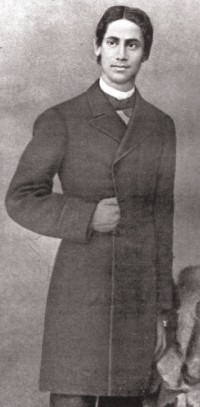|
Musings
Courting Rabindranath
Tamanna Khan
 |
Rabindranath Tagore |
On a very difficult episode of my life I had to spend a couple of days at the worst place in Bangladesh -- Dhaka Medical College Hospital. During that time, Rabindranath Tagore's verses were my only respite. Everyday, I beckoned God through “Aguner poroshmoni choyao praney a jibon punno koro” (Light my soul with thy holy flame, bless my life, bless my life with thy warmth)1.
Most probably, my first acquaintance with Rabindranath came through our national anthem, but I have very little recollection of the early school assemblies. However, I do remember the six-year-old trying hard to play “Aye tobay shohochori hatey hatey dhori dhori nachibo ghiri ghiri gahibo gaan ” (come my friends let's hold hands and sing and dance) on the harmonium. The recipe of the music lessons were quite set - one sargam (different arrangements of the musical notes), one raag (classical music), one choragaan (children's song) and last but not the least -- Rabindrasangeet. Back in those days I consciously avoided Nazrul's songs (songs written by our national poet Kazi Nazrul Islam) because of its difficult notation. Although I opted for Rabindrasangeet, the self-declared revolutionary inside me thought it was boring and not inspirational enough like the highly spirited Nazrul songs. That's when my elder sister took over the responsibility of helping me look at Rabindrasangeet from a different point of view. I stopped looking at the obvious meaning of the words rather tried to dig deep and soon found that songs like “Tumi je shurer agun lagiye diley mor praney” (You have ignited the fire of music in my soul) did not fall into the category of love songs, like I had previously thought. As I grew up Rabindranath Tagore revealed himself slowly through his poems, short stories and finally novels. While reading “Gora”, as a teenager, I was astounded to know how he had peeked inside my mind and through Shucharita and sometimes Lolita expressed everything that I felt. Tagore's heroines were not the all-sacrificing demure ones; they were humans with good and bad qualities. They often made mistakes and not always because of social restrictions. They wanted to make mistakes, break through the usual dos and don'ts. Thus as a grown up, I did not have any problem justifying Binodini's jealousy or Charulata's affair.
My special relationship with the Nobel laureate, however began on a rainy afternoon, as I was trying hard to play “Aji jhoro jhoro mukhoro badolo diney janine janine kichute kenoje mono lagey na” (today on such a rainy day, don't know why I cannot put my mind to anything) on my harmonium. Suddenly, my eyes fell on the back cover of the book which depicted a picture of Rabindranath Tagore, in his early thirties - tall handsome and poised in the manner of a king, with eyes that looked beyond the horizon. A gush of blood ran up my cheek and from then on the adulation continued. Rabindranath has been with me through thick and thin. When I could not find the words I wanted to say to my Creator in the surahs written in foreign Arabic, I sought “Klanti amar khoma koro probhu” (Forgive my weariness, God). During my university years when the heart was so prone to falling in love, Tagore said “Era shukher lagi chahe prem prem mele na” (They look for love for happiness, but fail to find love). With a broken heart I would find consolation in “Bhalobeshe jodi shukho nahi tobay keno miche bhalobasha” (If you are not happy in love then why fall in love).
It seems to me that Tagore has a song for every situation and every human feeling. When you are at a loss for words to express your deepest agony, fear or happiness look up Tagore's Geetobitan or Geetanjali. You'll find your answer.
1) Translation taken from: http://www.washingtonbanglaradio.com/content/rabindrasangeet-aguner-parashmani-rabindranath-tagore-translation-barnali-saha
Copyright
(R) thedailystar.net 2010
|

